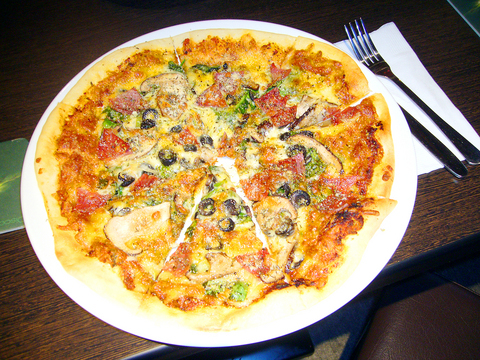Stan Chen (
When it opened in November, Chen's Captains Stone-oven Baked pizza restaurant was the target of a series of rude remarks that appeared on a popular local online bulletin board. Thankfully these disparaging comments didn't stop him from concentrating on the business at hand -- running a restaurant.
Like the aforementioned Alleycat's restaurant, Captains is a come-as-you-are type of dining establishment that has built a strong customer base already.

PHOTO: GAVIN PHIPPS, TAIPEI TIMES
The interior design is minimal and comprises several posters portraying Italian themes. The dining area is reasonably comfortable and offers diners a modicum of privacy. The menu is, like the joint itself, not overly large, but solid and filled with reasonably priced pizza staples.
Appetizers include pine nut pesto (NT$150), ricotta and anchovies (NT$150) and ricotta and salmon (NT$200) served on thinly sliced French bread, all of which are tasty and make for a pleasing accompaniment to any meal. Captains' salads include Caesar and chicken Caesar at NT$120 and NT$150 respectively, Greek salad (NT150) and the ever-popular capressa at NT$350.
Calzone flavors include tuna and spinach (NT$380), vegetarian (NT$380) as well as a house special, which comes filled with just about everything but the kitchen sink and costs NT$480.
There are several types of pizza on the menu and these range in price from NT$250 to NT$480. But one of the niceties about Captains is the fact that if the pizza of one's choice is not listed then patrons can opt to design their own pizza. Patrons get to choose from 20 ingredients, ranging from flavor boosters such as garlic and capers, to more wholesome ingredients like asparagus, salami, Mexican sausage and spinach.
The basic pizza costs NT$200 for a 10-inch thin crust or NT$250 for the 12-inch version. The individual toppings costing from between NT$30 to NT$60 and diners can opt for as many, or as few toppings as their wallets allow. Along with the pizza Captains also has a pretty reasonable selection of beers and of course all the usual popular flavors of soft drinks.

June 2 to June 8 Taiwan’s woodcutters believe that if they see even one speck of red in their cooked rice, no matter how small, an accident is going to happen. Peng Chin-tian (彭錦田) swears that this has proven to be true at every stop during his decades-long career in the logging industry. Along with mining, timber harvesting was once considered the most dangerous profession in Taiwan. Not only were mishaps common during all stages of processing, it was difficult to transport the injured to get medical treatment. Many died during the arduous journey. Peng recounts some of his accidents in

“Why does Taiwan identity decline?”a group of researchers lead by University of Nevada political scientist Austin Wang (王宏恩) asked in a recent paper. After all, it is not difficult to explain the rise in Taiwanese identity after the early 1990s. But no model predicted its decline during the 2016-2018 period, they say. After testing various alternative explanations, Wang et al argue that the fall-off in Taiwanese identity during that period is related to voter hedging based on the performance of the Democratic Progressive Party (DPP). Since the DPP is perceived as the guardian of Taiwan identity, when it performs well,

The Taiwan People’s Party (TPP) on May 18 held a rally in Taichung to mark the anniversary of President William Lai’s (賴清德) inauguration on May 20. The title of the rally could be loosely translated to “May 18 recall fraudulent goods” (518退貨ㄌㄨㄚˋ!). Unlike in English, where the terms are the same, “recall” (退貨) in this context refers to product recalls due to damaged, defective or fraudulent merchandise, not the political recalls (罷免) currently dominating the headlines. I attended the rally to determine if the impression was correct that the TPP under party Chairman Huang Kuo-Chang (黃國昌) had little of a

At Computex 2025, Nvidia CEO Jensen Huang (黃仁勳) urged the government to subsidize AI. “All schools in Taiwan must integrate AI into their curricula,” he declared. A few months earlier, he said, “If I were a student today, I’d immediately start using tools like ChatGPT, Gemini Pro and Grok to learn, write and accelerate my thinking.” Huang sees the AI-bullet train leaving the station. And as one of its drivers, he’s worried about youth not getting on board — bad for their careers, and bad for his workforce. As a semiconductor supply-chain powerhouse and AI hub wannabe, Taiwan is seeing